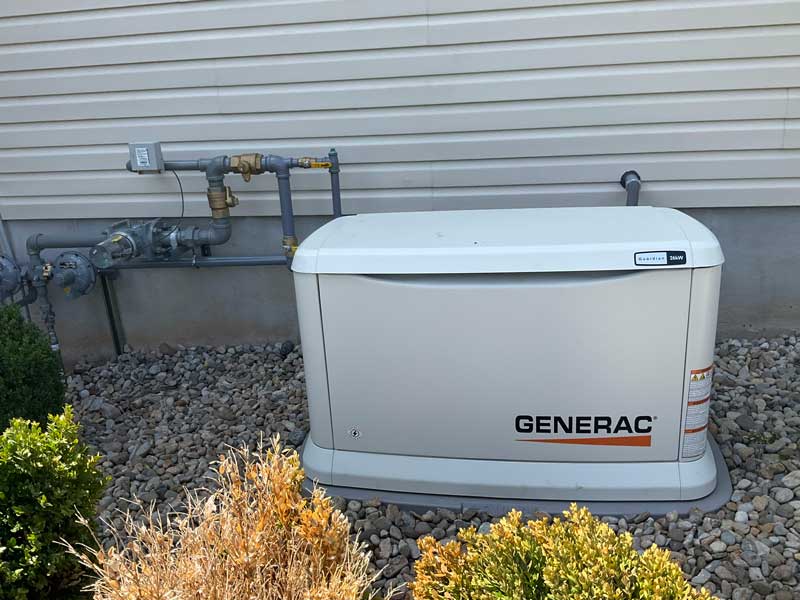June 30, 2025
Types of Generac Generators and Their Pros and Cons
When the lights go out unexpectedly, having a reliable generator makes all the difference. Generac, a leading name in the generator industry, offers a variety of models to suit different needs. Explore the types of Generac generators for homes, their advantages and disadvantages, and which one might be the best fit for your needs.

What Are the Different Types of Generac Generators?
Generac manufactures several types of generators that work best in different situations:
- Portable generators are versatile, gasoline- or diesel-powered units you can move around as needed. They’re ideal for powering tools at job sites, charging gadgets on camping trips, and providing temporary backup during outages.
- Inverter generators are a subset of portable generators known for producing clean, stable power. They typically run on gasoline and are intended to provide temporary power for RVs, trailers, and mobile homes.
- Standby generators are permanently installed outside your home and automatically kick in during a power outage. They’re connected directly to your home’s electrical system and usually run on natural gas or propane.
What Are the Pros and Cons of Generac Generators for Homes?
While there are many benefits of Generac generators, it’s equally important to weigh the potential Generac generator disadvantages before making a decision.
Portable Generators
Pros:
- Versatility: Portable generators can be used in various settings, from remote construction or camping sites to short-term home emergencies.
- Affordability: Portable generators have a much lower upfront cost than standby models. If you need backup power but aren’t ready for a major investment, a portable unit is a budget-friendly alternative.
- Simple setup: While standby models require professional installation, the user can set up and start a portable generator themselves.
Cons:
- Manual operation: Portable generators don’t turn on automatically during an outage. You’ll need to set them up, fill the fuel tank, start them, and manually connect the appliances or devices you want to power.
- Fuel storage and availability: Most portable generators run on gasoline, so you must store fuel safely on site. Gasoline has a limited shelf life, and if an outage lasts several days, you may struggle to find more at gas stations.
- Noise level: Traditional portable generators operate loudly, which could disrupt neighbors in residential areas.
Standby Generators
Pros:
- Automatic activation: Standby generators kick in within seconds of losing power. This is possible thanks to a transfer switch that connects the generator directly to your home’s electrical panel.
- Whole-home power: A large enough standby generator can power your entire home. Refrigerators, HVAC systems, lights, medical equipment—everything stays up and running to minimize disruption to your routine.
- Continuous fuel supply: Standby generators are typically powered by natural gas or propane, which means no messy refueling, no inconvenient fuel storage, and indefinite power during an extended outage.
- Increased home value: Installing a standby generator boosts property value. Homebuyers consider a built-in generator a premium feature, especially in areas prone to power outages.
Cons:
- Higher initial investment: The cost to purchase and install the unit is much higher than a portable or inverter generator.
- Professional installation requirements: Standby generators must be installed by a qualified technician. The work involves electrical wiring, fuel line connections, and potential landscape adjustments to facilitate proper placement and ventilation.
- Installation constraints: Since standby generators are permanently installed outside the home, they require a designated space that meets local regulations. While this usually isn’t a problem for larger properties, it may pose a challenge for homeowners with limited yard space.
- Regular maintenance needs: Because standby generators are long-term power solutions, they require periodic maintenance to ensure reliability. Be prepared to perform oil changes, battery checks, and routine system tests.
Why Choose Seidel Electric Inc?
For the most reliable, long-term power backup solution, consider installing a standby Generac generator. Seidel Electric Inc. can outfit your Tri-State-Area home with this dependable power source or recommend a portable or inverter unit for more occasional use. Our knowledgeable electricians provide free in-home consultations to help you choose the right generator size and model for your needs. Contact us today for a generator installation estimate and experience firsthand how We Power Life.
